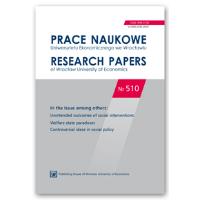INDIVIDUAL CHARACTERISTICS OF NON-GOVERNMENTAL ORGANIZATION LEADERS AND THE ORGANIZATIONS’ READINESS TO IMPLEMENT SOCIAL INNOVATIONS
INDIVIDUAL CHARACTERISTICS OF NON-GOVERNMENTAL ORGANIZATION LEADERS AND THE ORGANIZATIONS’ READINESS TO IMPLEMENT SOCIAL INNOVATIONS
Author(s): Katarzyna Zajda, Sławomir PasikowskiSubject(s): Welfare systems, Evaluation research, Welfare services
Published by: Wydawnictwo Uniwersytetu Ekonomicznego we Wrocławiu
Keywords: local social policy; non-governmental organizations; social innovations; individual characteristics of rural NGO leaders;
Summary/Abstract: The aim of the article is to answer the following research question: Are there any differences between individual characteristics of the leaders of non-governmental organizations which represent different readiness to implement social innovations? The answer will be based on the study carried out in 2017 in 29 rural communes of Łódzkie Province, with 104 NGO leaders as participants. Five research tools were used, including psychological instruments to measure social competencies of NGO leaders, their openness to experience, readiness to resist, and locus of control. The respondents’ education and sex were also analyzed. The analyses show that the leaders of organizations that are ready to implement social innovations have higher assertive competencies, cooperative competencies and social resourcefulness than do the leaders of organizations that are not yet willing to do so.
Journal: Prace Naukowe Uniwersytetu Ekonomicznego we Wrocławiu
- Issue Year: 2018
- Issue No: 510
- Page Range: 207-216
- Page Count: 10
- Language: English

